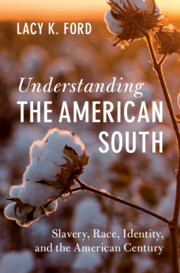4 results

Understanding the American South
- Slavery, Race, Identity, and the American Century
-
- Published online:
- 05 December 2024
- Print publication:
- 12 December 2024
6 - “Have No Fellowship I Pray You, with These Merciless Menstealers”
-
- Book:
- Advocates of Freedom
- Published online:
- 07 September 2020
- Print publication:
- 17 September 2020, pp 219-254
-
- Chapter
- Export citation
Chapter 18 - A Civil Rights–Era Novel of the American Civil War
-
-
- Book:
- New Orleans
- Published online:
- 23 August 2019
- Print publication:
- 05 September 2019, pp 242-251
-
- Chapter
- Export citation
Chapter 16 - “Because What Else Could He Have Hoped to Find in New Orleans, If Not the Truth”
-
-
- Book:
- New Orleans
- Published online:
- 23 August 2019
- Print publication:
- 05 September 2019, pp 210-224
-
- Chapter
- Export citation


